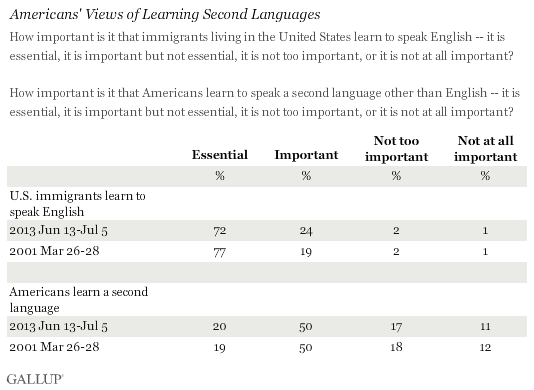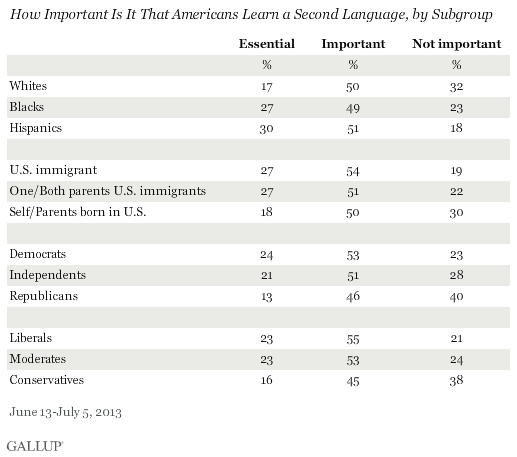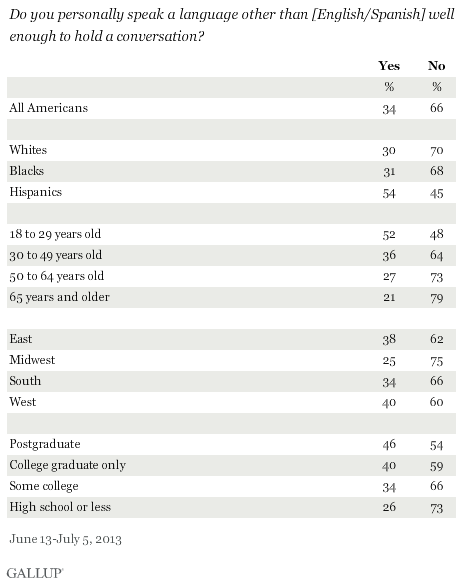PRINCETON, NJ -- Seventy-two percent of Americans say it is essential that immigrants living in the United States learn to speak English. Meanwhile, 20% believe it is essential that Americans learn a second language other than English. These views have changed little since Gallup first asked the question 12 years ago.

These data are from Gallup's annual Minority Rights and Relations poll. Although it is not uncommon to hear people speak languages other than English in the U.S., or to see signs and storefronts in languages other than English, Americans still believe it is critical that immigrants learn English. In fact, one of the requirements for U.S. citizenship is the ability to speak and write English. And one of the proposed requirements in legislation to create "a path to citizenship" for immigrants here illegally is to learn English.
Americans in the major U.S. racial and ethnic groups believe immigrants should learn English, though Hispanics are a bit less likely to say this than blacks and especially whites.

Similarly, Americans who themselves, or whose parents, immigrated to the U.S. are also less likely to believe immigrants should learn English. This is partly a function of Hispanics' being much more likely than whites or blacks to be recent U.S. immigrants.
Although a majority of all political subgroups believe it is essential that immigrants learn to speak English, Republicans and conservatives are far more likely to hold this view than are Democrats and liberals.
Whites Attach Less Importance to Americans' Learning a Second Language
Hispanics and blacks are more likely than whites to believe Americans in general should learn a language other than English. Thirty percent of Hispanics, 27% of blacks, and 17% of whites say it is essential that Americans learn a second language.

Additionally, Democrats are more likely than Republicans to believe Americans should learn a second language. There are modest differences by political ideology and immigrant status.
One in Three Americans Know a Second Language
Thirty-four percent of Americans say they know a second language well enough to hold a conversation. Knowledge of a second language is higher among Hispanics, those with higher education levels, younger Americans, and those living in the East and West.

Hispanics are nearly twice as likely as whites or blacks to say they know a second language.
Seventy-four percent of Hispanics interviewed in English said they know a second language, almost all of whom identified that second language as Spanish. A much smaller proportion of Hispanics interviewed in Spanish, 23%, said they know a second language. Almost all of those respondents identified the second language as English.
Overall, Americans who speak a second language overwhelmingly identify Spanish as their second language, at 60%, followed by French (18%) and German (12%). At least 1% of Americans claim to know each of 13 other languages.
![Which language other than [English/Spanish] do you speak? [OPEN-ENDED] June-July 2013 results](http://content.gallup.com/origin/gallupinc/GallupSpaces/Production/Cms/POLL/xn7dvnddnek8rdlurr3e2g.png)
While it is not surprising that a majority of U.S. Hispanics who know a second language say they can speak Spanish, a majority of bilingual whites and blacks also say they can speak Spanish. After Spanish, French is the next-most-common second language among blacks and whites, while it is English for Hispanics. Whites are a lot more likely than blacks or Hispanics to speak German.
Implications
Although one in three Americans know a second language, the public generally does not think it is essential that Americans learn to speak a second language. Rather, it is probably viewed as more of a desirable skill than an essential one for those living in the United States.
However, the public does think that those who immigrate to the U.S. should learn to speak English. It is not clear if that view is due to a desire to see immigrants assimilate into traditional U.S. customs and norms, or, more practically, in terms of their being able to function effectively in U.S. society.
Regardless of the reason, government leaders appear to agree that immigrants should learn to speak English, given the immigration-reform legislation proposal to require it of illegal immigrants seeking to gain legal status in the U.S.
Survey Methods
Results for this Gallup poll are based on telephone interviews conducted June 13-July 5, 2013, with a random sample of 4,373 adults, aged 18 and older, living in all 50 U.S. states and the District of Columbia, including oversamples of black and Hispanic adults. The total sample is weighted to represent racial and ethnic groups proportionately to their share of the population. All respondents had previously been interviewed for the Gallup Daily tracking survey.
For results based on the total sample of national adults, one can say with 95% confidence that the margin of sampling error is ±2 percentage points.
For results based on the total sample of 2,149 non-Hispanic whites, one can say with 95% confidence that the margin of sampling error is ±3 percentage points.
For results based on the total sample of 1,010 non-Hispanic blacks, one can say with 95% confidence that the margin of sampling error is ±5 percentage points.
For results based on the total sample of 1,000 Hispanics, one can say with 95% confidence that the margin of sampling error is ±6 percentage points.
Interviews are conducted with respondents on landline telephones and cellular phones, with interviews conducted in Spanish for respondents who are primarily Spanish-speaking.
Samples are weighted to correct for unequal selection probability, non-response, and double coverage of landline and cell users in the two sampling frames. They are also weighted to match the national demographics of gender, age, race, Hispanic ethnicity, education, region, population density, and phone status (cell phone-only/landline only/both and cell phone mostly). Demographic weighting targets are based on the March 2012 Current Population Survey figures for the aged 18 and older U.S. population. Phone status targets are based on the July-December 2011 National Health Interview Survey. Population density targets are based on the 2010 census. All reported margins of sampling error include the computed design effects for weighting.
In addition to sampling error, question wording and practical difficulties in conducting surveys can introduce error or bias into the findings of public opinion polls.
View methodology, full question results, and trend data.
For more details on Gallup's polling methodology, visit www.gallup.com.
